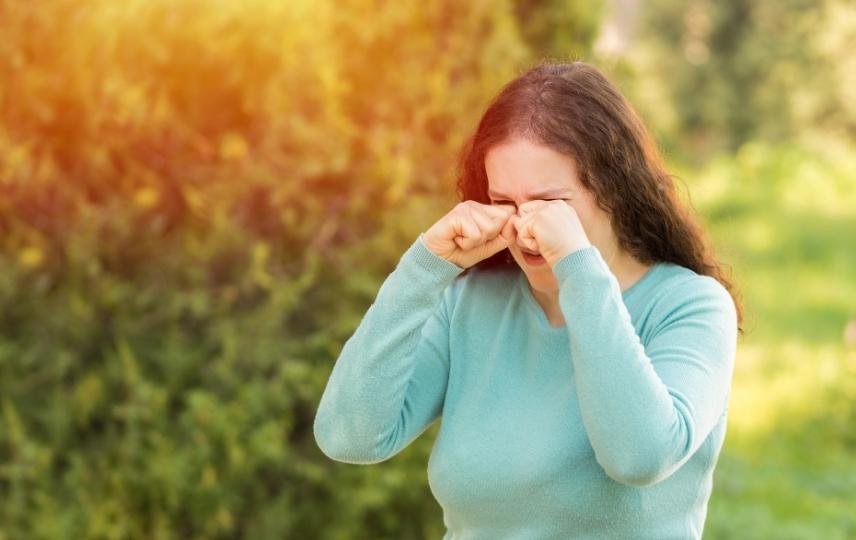Allergic conjunctivitis, known as eye allergy, occurs when the eye is exposed to certain allergens. The protective outer layer of the eyelid, called the conjunctiva, that is exposed to the allergen becomes swollen or inflamed due to irritants. Eye allergies may be seasonal or may persist throughout the year. In this article, we have written the details about eye allergy treatment for you.
Information and Appointment Request Form
What Can Cause Eye Allergies?
Many allergens and irritants can cause eye allergies. People with eye allergies may experience changes in the allergen. The main allergens that cause this condition are: pollen, mold, dust mites, pet dander, cosmetics, contact lens, etc.
How Is It Treated?
The most effective treatment for eye allergy is to reduce exposure to the allergen. Reducing exposure to allergens may not always be possible. However, some awe to watch out for can reduce your exposure.
Outdoor Exposure:
If pollen causes eye allergies, try to stay at home when pollen counts are high. Local weather conditions can be informative about pollen levels.
Avoid using fans that can draw outdoor allergens into your home.
Take some precautions to minimize pollen exposure when spending time outside. For example, wearing glasses can slightly reduce your exposure.
Avoid rubbing or scratching your eyes as much as possible. Scratching or rubbing your eyes can increase irritation and make your condition worse.
Indoor Exposure:
Try to keep the windows closed as much as possible. Use air conditioner in your home or car. Make sure air conditioner filters are cleaned and maintained regularly.
Reduce exposure to dust mites, especially in your bedroom. Use allergen-proof covers for your bedding. Wash your linens on high heat every week.
Try to prevent mold growth by keeping the humidity in your home low. Constantly check areas of the house that may harbor mold and make sure they are clean. You can use a humidifier to keep the humidity level in the house constant.
When cleaning the house, try to do it damp instead of dry cleaning. For example, wipe floors or floors with damp cloths instead of dry cloths.
Pet Exposure:
Wash your hands immediately after touching the animal you are allergic to. If you have been in a pet environment, change and wash your clothes as soon as you get home.
Keep the pet with allergies away from your home as much as possible. If the pet needs to be at home, keep it out of your bedroom.
If you have a pet in your home, get help from someone else to regularly screen your pet.
Drugs Used in Treatment
There are some drugs used in the treatment of eye allergy. Your allergist will prescribe the appropriate medicine for you according to the condition of your allergy and the severity of your symptoms. There are also over-the-counter allergy medications, but be sure to ask your allergist about which medication you should use.
Tear Substitutes
Artificial tears can temporarily clear allergens from the eye. However, it can moisturize dry eyes.
Decongestants
These drops are effective in reducing the redness caused by allergies by constricting the blood vessels in the eye. However, long-term use of these drugs can cause conditions such as the return of symptoms. Therefore, be sure to use it for the time recommended by your doctor.
Oral Antihistamines
Oral antihistamines can be mildly effective in relieving itching associated with eye allergies.
Antihistamine Eye Drops
These medications can be effective in reducing the symptoms of itching, swelling and redness caused by eye allergies.
Mast Cell Stabilizing Eye Drops
These drugs block the release of histamine and other substances that cause allergy symptoms. To prevent itching, the drops should be used before exposure to an allergen.
Antihistamine And Mast Cell Stabilizer Eye Drops
Some of the newest eye drops contain both an antihistamine and a mast cell stabilizer to treat and prevent eye allergies. Used twice a day, they provide quick, long-lasting relief from itching, redness, and burning.
Corticosteroid Eye Drops
These can help treat chronic, serious eye allergy symptoms such as itching, redness, swelling. These drugs should only be used under the supervision of a doctor.
Pink Eye or Allergy?
Allergic conjunctivitis and pink eye, which is a conjunctivitis caused by a virus or bacteria, are different conditions that can be confused with each other. Bacterial infections that cause pink eye often contain yellow or greenish discharge, while eye allergy tends to relieve secretions and itching. Most conjunctivitis are viral rather than bacterial and will heal after applying a warm compress. If only one eye is affected, be careful not to touch or apply anything to the unaffected eye after touching the problem eye. Eye allergy tends to cause clear secretions and itching, while bacterial infections often involve yellow or greenish secretions.
Do not use medication without a thorough eye exam. If you suspect you have an eye allergy, consult an allergist to find out the underlying cause of the allergy.
Does Eye Allergy Cause Dry Eyes?
If your eyes are dry and irritated during the winter months when there are fewer outdoor allergens, you may have a type of tear dysfunction known as dry eye or “keratoconjunctivitis sicca.” This is not an allergic reaction; It happens when your eyes either don’t get enough tears or the tears go away too quickly. Dry eye is a condition that affects many people. However, most people with allergies also have this condition. If you are experiencing dry eye caused by your eye allergy, you can get relief by using some drops prescribed by your doctor.




